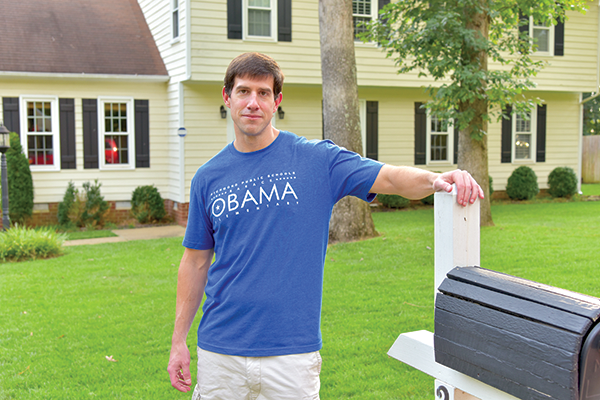Offering a helping hand
Pro-bono programs assist people who can’t afford to hire attorneys
Joan Tupponce //August 30, 2018//
Offering a helping hand
Pro-bono programs assist people who can’t afford to hire attorneys
Joan Tupponce //August 30, 2018//
Cheryl Brown now is living in a newly repaired apartment in Richmond, thanks to legal assistance provided without charge by attorney Chip Nunley.
Brown, a heart transplant recipient who uses a wheelchair, had told the management of her apartment complex that her ceiling was leaking and water was seeping into the kitchen. Eventually, the ceiling began to bow.
“She was in her kitchen cooking dinner one night, when the ceiling collapsed and sent her to the hospital,” says Nunley, a partner at Hunton Andrews Kurth in Richmond. “The apartment complex didn’t do anything about it.”
Nunley learned about Brown’s predicament through JusticeServer, a custom-designed online case management system. It is an example of Virginia programs designed to provide pro-bono legal services to people who can’t afford attorneys.
In November, Nunley filed suit on Brown’s behalf in Richmond General District Court. In April, the apartment complex was ordered to move her and her belongings to another apartment in the complex, providing suitable alternative housing until repairs in the new unit were completed. “They were additionally required to cover the cost of moving her from the old to the new apartment,” Nunley says.
The attorney has represented about 40 residents in Brown’s complex. Several of those cases came from JusticeServer. “The vast majority of these people suffered in silence,” he says. “There is a tremendous need for lawyers in private practice to do pro-bono work for people who have real and fundamental legal problems like housing and can’t afford to hire an attorney.”
2010 conference
JusticeServer automates the process of matching lawyers to cases. “It cuts out all of the inefficiencies so lawyers can spend their time representing people rather than tracking down information,” Nunley says.
To gain access to the JusticeServer, attorneys sign up with legal-aid societies that use it and specify the type of cases they are interested in handling. Once they are in the system, lawyers have secure, confidential access to files. They can subscribe to an email notification service that alerts them when a case matching their experience is listed.
The creation of JusticeServer resulted from the Supreme Court of Virginia’s 2010 Pro Bono Summit, which examined the need to improve legal services to underserved clients. Capital One Financial Corp. developed an information management and case referral system, leading a project team that included the Greater Richmond Bar Foundation, the Central Virginia Legal Aid Society, the Legal Aid Justice Center and the Virginia Bar Association Pro Bono Task Force. JusticeServer was launched in 2012. The portal went public the next year.

“My firm alone has handled well over 1,000 cases through JusticeServer since it started.”
More than 1,000 lawyers and law students in the Central Virginia area have registered for JusticeServer since its launch, and more than 10,160 cases have been handled. “That includes legal-aid clients and our nonprofit assistance program,” says Alexandra “Ali” Fannon, executive director of the Greater Richmond Bar Foundation.
A hotline provided by the Virginia Bar Association’s Young Lawyers Division also uses JusticeServer to find cases. Volunteer attorneys contact callers to see whether they can provide limited answers to their questions.
“Young attorneys love JusticeServer. Instead of going to legal aid and getting a list of people, they can log onto the system at home or on their lunch break to see what calls need to be made,” says Johnson. “It makes things more efficient. It makes our ability to provide service easier.”
Tackling veterans’ issues
The aim of another Virginia pro-bono program is helping veterans, military service members and their families. They can find assistance through the Veterans Issue Task Force of the Virginia Bar Association (VBA). The task force evaluates requests for legal help, matching them up with Virginia lawyers who provide their services for free or reduced fees.

Barrett, a veteran himself, is keenly aware of veterans’ needs. When veterans return to civilian life, they no longer have access to a variety of resources, including the services of Judge Advocate General (JAG) officers on their base. “Veterans don’t know where or who to turn to,” says Barrett, associate general counsel at Performance Food Group in Richmond.
The task force also can help active-duty service members when JAG officers are not licensed in the service members’ state or don’t have the expertise needed for their problems. “They are not always available to provide support,” Barrett says of JAG.
The task force grew out of a talk by Major Joseph Geraci, a United States Military Academy psychology professor, at a 2009 VBA meeting. Geraci highlighted the psychological and legal problems many veterans face.
“He gave a very meaningful speech that resonated with a lot of the VBA leadership,” Barrett says. Bar association members decided “this is a problem we are facing as a society” and they should help. They started the task force that year.
More than 280 attorneys are listed with the task force, which gets requests on issues ranging from housing and divorce to civil rights and employment.
“Some days we get five requests, and then there are days when we don’t receive a request,” Barrett says, noting that people can ask for help through vba.org/veterans. “It comes in waves.”
The task force handles only Virginia cases. Currently about 20 percent of the requests are placed with attorneys. “I wish the percentage was better, “ Barrett says. “Sometimes we don’t have an attorney in their geographic area, and sometimes we just don’t have attorney volunteers and coverage for certain types of cases.”
The task force works with other groups such as William & Mary Law School’s Puller Veterans Benefits Clinic. “We have an informal partnership with them. They can help with veteran’s benefits sometimes,” Barrett says.
The task force also offers training sessions for lawyers and veterans. “I have done training seminars over the years,” Barrett says. “I will be giving one on hiring veterans to try and provide some insight into the laws that apply when you hire veterans or service members.”
In addition, the task force provides training on the challenges that military service members often face in returning home. “We also do veteran’s advocacy, looking at what legislation can be passed to help veterans as well as service members and their families,” Barrett says.
e


















